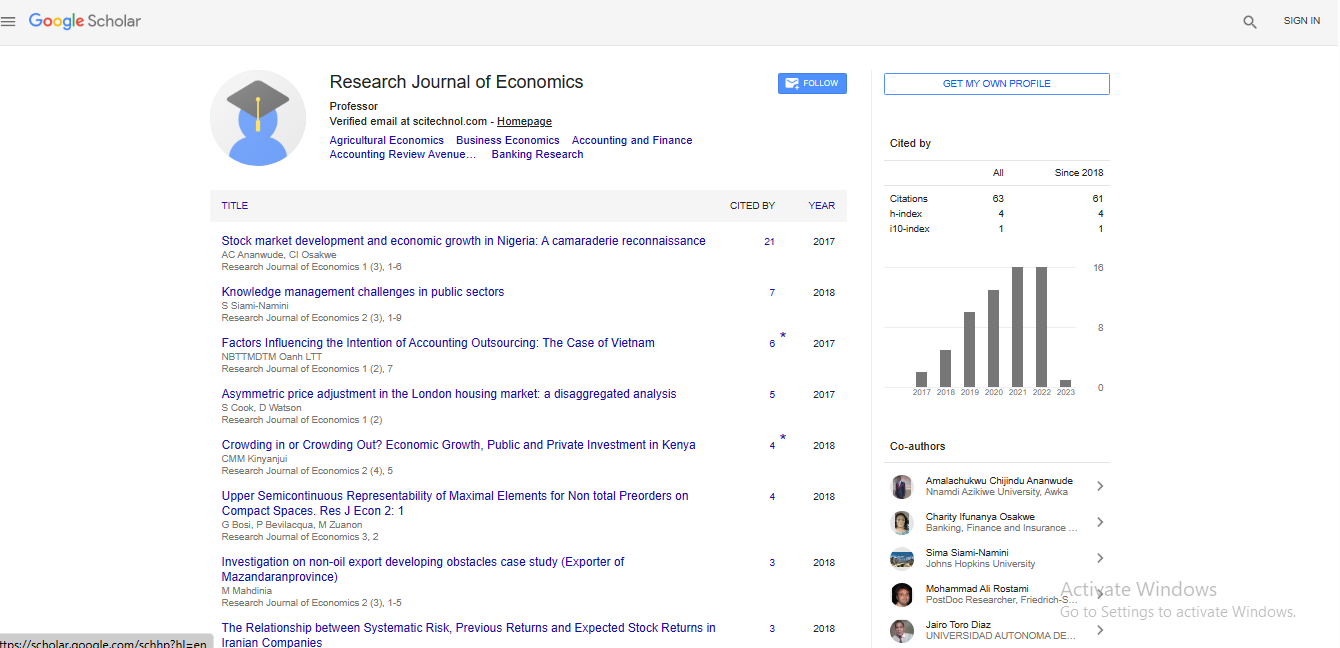Perspective, Res J Econ Vol: 7 Issue: 4
Modern Portfolio Theory: A Time-Tested Guide to Navigating Market Dynamics and Uncertainties
Claude Oden*
1Department of Industrial and Management Systems Engineering, University of South Florida, Tampa, United States of America
*Corresponding Author: Claude Oden,
Department of Industrial and Management
Systems Engineering, University of South Florida, Tampa, United States of
America
E-mail: odencla@usf.edu
Received date: 28 June, 2023, Manuscript No. RJE-23-113060;
Editor assigned date: 30 June, 2023, PreQC No. RJE-23-113060 (PQ);
Reviewed date: 14 July, 2023, QC No. RJE-23-113060;
Revised date: 21 July, 2023, Manuscript No. RJE-23-113060 (R);
Published date: 28 July, 2023, DOI: 10.4172/RJE.1000161
Citation: Oden C (2023) Modern Portfolio Theory: A Time-Tested Guide to Navigating Market Dynamics and Uncertainties. Res J Econ 7:4
Description
Modern Portfolio Theory (MPT) is a foundational concept in investment management that guides portfolio construction and optimization. This theory was developed by Harry Markowitz in the 1950s, revolutionized investment strategies by emphasizing the importance of diversification and the relationship between risk and return in portfolio construction. Modern Portfolio Theory (MPT) has played a pivotal role in reshaping investment management strategies, but it faces challenges and limitations in capturing the complexities of real-world markets.
Modern technology enables more sophisticated risk modelling and optimization techniques Modern Portfolio Theory offers valuable insights into portfolio construction, it encounters challenges in capturing evolving market dynamics, non-normal distributions, and investor behavioral biases. Factor models use attributes like value, size, and momentum to construct portfolios that go beyond traditional MPT considerations. MPT posits that diversifying investments across different assets reduces portfolio risk while maintaining or improving expected returns. MPT recognizes the positive correlation between risk and potential return.
Investors aim to find an optimal balance between risk and return based on their risk tolerance. MPT defines the efficient frontier as the set of portfolios that offers the highest expected return for a given level of risk or the lowest risk for a given expected return. Quantifying the average return an investor expects from holding a particular asset or portfolio. Measuring the uncertainty or variability of returns. Variance and standard deviation are commonly used risk metrics. Understanding the relationships between asset returns to assess how they move in relation to each other.
Benefits of Modern Portfolio Theory (MPT)
MPT assists in constructing portfolios that maximize expected returns while minimizing risk, based on individual investor preferences. Diversification helps manage and mitigate unsystematic or idiosyncratic risk. MPT introduces a quantitative framework for decision-making, aiding in objective portfolio selection. MPT suggests spreading investments across different asset classes, industries, and geographic regions to achieve diversification. MPT helps investors determine the optimal mix of assets in their portfolio based on their risk tolerance and investment goals. By analyzing covariance and correlation, investors can identify assets that have lower correlations, thus reducing portfolio risk.
Alternatives to traditional MPT
Minimum variance portfolios: Emphasize risk reduction by minimizing portfolio volatility while allowing for different return expectations.
Maximum diversification portfolios: Seek to maximize diversification by allocating assets that have low correlations.
Post-modern portfolio theory: Incorporates alternative assets and the effects of market frictions to enhance portfolio optimization.
Behaviour finance integration: Integrating insights from behavioral finance accounts for investor biases and irrational behavior.
Risk parity strategy: Allocates assets based on risk contributions, equalizing the impact of each asset's risk on the overall portfolio.
Limitations
MPT assumes that asset returns follow a normal distribution, and it relies on historical data for estimates, which might not hold true in all market conditions. The efficient market hypothesis underlying MPT assumes perfect information availability, whereas markets exhibit varying degrees of efficiency. MPT assumes that markets are efficient and that investors have access to all relevant information, which may not always be the case. MPT doesn't fully account for behavioral biases that can impact investment decisions. Real-world asset returns often deviate from the normal distribution assumed by MPT, leading to potential inaccuracies in risk and return estimations. MPT may not adequately account for extreme events with low probabilities but high impacts, like financial crises.
Conclusion
Modern Portfolio Theory (MPT) remains a fundamental framework for investment management, guiding investors in creating diversified and efficient portfolios. While MPT's assumptions and limitations are acknowledged, its principles continue to shape the foundation of portfolio construction strategies. In the evolving landscape of investment management, MPT serves as a valuable tool for investors to navigate the complexities of risk and return trade-offs, supported by advances in analytics and technology. Practitioners navigate the challenges by integrating insights from behavioral finance, embracing alternative portfolio construction approaches, and leveraging advanced risk management techniques. As the field continues to advance, combining the foundational principles of MPT with innovative strategies enhances portfolio management in a dynamic and everchanging market environment.
 Spanish
Spanish  Chinese
Chinese  Russian
Russian  German
German  French
French  Japanese
Japanese  Portuguese
Portuguese  Hindi
Hindi 